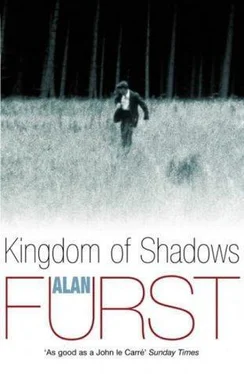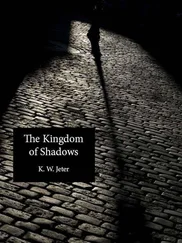Alan Furst - Kingdom of Shadows
Здесь есть возможность читать онлайн «Alan Furst - Kingdom of Shadows» весь текст электронной книги совершенно бесплатно (целиком полную версию без сокращений). В некоторых случаях можно слушать аудио, скачать через торрент в формате fb2 и присутствует краткое содержание. Жанр: Шпионский детектив, на английском языке. Описание произведения, (предисловие) а так же отзывы посетителей доступны на портале библиотеки ЛибКат.
- Название:Kingdom of Shadows
- Автор:
- Жанр:
- Год:неизвестен
- ISBN:нет данных
- Рейтинг книги:5 / 5. Голосов: 1
-
Избранное:Добавить в избранное
- Отзывы:
-
Ваша оценка:
- 100
- 1
- 2
- 3
- 4
- 5
Kingdom of Shadows: краткое содержание, описание и аннотация
Предлагаем к чтению аннотацию, описание, краткое содержание или предисловие (зависит от того, что написал сам автор книги «Kingdom of Shadows»). Если вы не нашли необходимую информацию о книге — напишите в комментариях, мы постараемся отыскать её.
Kingdom of Shadows — читать онлайн бесплатно полную книгу (весь текст) целиком
Ниже представлен текст книги, разбитый по страницам. Система сохранения места последней прочитанной страницы, позволяет с удобством читать онлайн бесплатно книгу «Kingdom of Shadows», без необходимости каждый раз заново искать на чём Вы остановились. Поставьте закладку, и сможете в любой момент перейти на страницу, на которой закончили чтение.
Интервал:
Закладка:
“Could be a little more, by the time it’s done, but I trust Wolfi for it.” For a moment, he stared at the dead officer. “Our friend here is drunk,” he said to Morath. “We’re going to get his arms around our shoulders and carry him downstairs. I’d ask you to sing, but something tells me you won’t. Anyhow, there’s a taxi at the door, the driver is in on it. We’ll put our friend here in the backseat, I’ll get in with the driver, and that’s that. The jacket, the gun, the wallet, you find a way to get rid of those. If it was me, I’d burn the papers.”
Eventually, Morath and the desk man had to carry Stieffen downstairs-the pantomime played out only from the street door to the taxi, and they barely made it that far.
A blue car-later he thought it was a big Peugeot-pulled to the curb in front of him. Slowly, the back window was lowered and the little man in the bow tie stared out at him. “Thank you,” he said. The window was rolled back up as the car pulled away, following the taxi.
Morath watched as they drove off, then returned to the apartment where Szubl, stripped to his underwear, was scrubbing the floor and whistling a Mozart aria.
Polanyi outdid himself, Morath thought, when he chose a place to meet. A nameless little bar in the quarter known as the grande truanderie, the thieves’ palace, buried in the maze of streets around Montorgueil. It reminded Morath of something Emile Courtmain had once told him: “The truth of lunch is in the choice of the restaurant. All that other business, eating, drinking, talking, that doesn’t mean very much.”
Polanyi sat there, looking very sorrowful and abused by the gods. “I’m not going to apologize,” he said.
“Do you know who he was? Colonel Stieffen?”
“No idea. And no idea why it happened. To do with honor, Nicholas-if I had to bet, I’d bet on that. He puts his wallet on the table, meaning this was who I was, and does it in a secret apartment, meaning this is where I failed.”
“Failed at what?”
Polanyi shook his head.
They were sitting at one of the three tables in the room. The fat woman at the bar called out, “Say, boys, let me know when you’re ready for another.”
“We will,” Polanyi said.
“Who’s the little man with the bow tie?”
“He is called Dr. Lapp.”
“Dr. Lapp.”
“A name. Certainly there are others. He is an officer in the Abwehr.”
“Oh well, that explains it then. I’ve become a German spy. Should we stay for lunch?”
Polanyi took a sip of wine. He was like, Morath thought, a man going to work. “They’re going to get rid of him, Nicholas. It’s dangerous for me to tell you that, and dangerous for you to know it, but this Colonel Stieffen has opened a door and now I have, against my better judgment, believe me, to let you inside.”
“To get rid of who?”
“Hitler.”
No answer to that.
“If they fail, we will have war, and it will make the last one look like a tea party. The fact is, if you hadn’t called me, I was going to call you. I believe it’s time for you to think seriously about how to get your mother and your sister out of Hungary.”
It had a life of its own, the war, like an immense rumor, that wound its way through the newspapers, the cafes, and the markets. But somehow, in Polanyi’s voice, it was fact, and Morath, for the first time, believed it.
Polanyi leaned forward, his voice confidential. “Hitler is going to settle, as he puts it, with the Czechs. The Wehrmacht will invade, probably in the fall-the traditional time, when the harvest is in and the men from the countryside become soldiers. Russia is pledged to defend Czechoslovakia if France does. The Russians will march through Poland, with or without the Poles’ permission, but she’ll invade us. You know what that means-Mongolian cavalry and the Cheka and all the rest of it. France and England will invade Germany through Belgium-this is no different than 1914. Given the structure of treaties in Europe, the alliances, that is exactly what is going to happen. Germany will bomb the cities, fifty thousand casualties every night. Unless they use phosgene gas, then it’s more. Britain will blockade the ports, central Europe will starve. The burning and the starving will go on until the Red Army crosses the German border and destroys the Reich. Will they stop there? ‘God lives in France,’ as the Germans like to say-perhaps Stalin will want to go and see Him.”
Morath looked for contradictions. He couldn’t find them.
“This is what worries me, this is what ought to worry you, but this means very little to the OKW, the Oberkommando Wehrmacht, the army’s general staff. Those people-the map people, the logistics people, the intelligence people-have always been accused, by operational commanders, of thinking more than is good for them, but this time they’ve got it right. If Hitler attacks Czechoslovakia-which is easy for Germany because, since the Anschluss, they surround the Czechs on three sides-England, France, and Russia will come into the war. Germany will be destroyed. But, more important to the OKW, the army will be destroyed. Everything they’ve worked for, since the ink dried on the treaties in 1918, will be torn to pieces. Everything. They can’t let that happen. And they know, with Hitler protected by the SS, that only the army has the strength to remove him.”
Morath thought for a time. “In a way,” he said, “this is the best thing that could happen.”
“If it happens, yes.”
“What can go wrong?”
“Russia fights only if France does. France and England will fight only if Germany invades and the Czechs resist. Hitler can be removed only for starting a war he can’t win.”
“Will the Czechs fight?”
“They have thirty-five divisions, about 350,000 men, and a defensive line of forts that runs along the Sudetenland border. Said to be good-as good as the Maginot Line. And, of course, Bohemia and Moravia are bordered by mountains, the Shumava. For the German tanks, the passes, especially if they are defended, will be difficult. So, certain people in the OKW are making contact with the British and the French, urging them to stand firm. Don’t give Hitler what he wants, make him fight for it. Then, when he fights, the OKW will deal with him.”
“Making contact, you said.”
Polanyi smiled. “You know how it’s done, Nicholas, it’s not a lone hero, crawling through the desert, trying to save the world. It’s various people, various approaches, various methods. Connections. Relationships. And when the OKW people need a quiet place to talk, away from Berlin, away from the Gestapo, they have an apartment in the rue Mogador-where that rogue Von Schleben sees his Roumanian girlfriend. Who knows, it might even be a place to meet a foreign colleague, over from London for the day.”
“A setting provided by their Hungarian friends.”
“Yes, why not?”
“And, similarly, the man we brought into Paris.”
“Also for Von Schleben. He has many interests, many projects.”
“Such as …”
Polanyi shrugged. “He didn’t explain, Nicholas. I didn’t insist.”
“And Colonel Stieffen?” Now they’d ridden the merry-go-round back to where they’d started. Morath might have gotten the brass ring, he wasn’t sure.
“Ask Dr. Lapp,” Polanyi said. “If you feel you have to know.”
Morath, puzzled, stared at his uncle.
“If you should happen to see him, I meant to say.”
On Saturday mornings, Cara and Nicky went riding in the Bois de Boulogne, on the Chemin des Vieux Chenes, or around the Lac Inferieur. They rode big chestnut geldings, the sweat white and foamy above the horses’ hocks in the midsummer heat. They rode very well; they both came from countries where horseback riding was part of life, like marriage or religion. Sometimes Morath found the bridle paths boring, too sedate-he had galloped into machine-gun positions and jumped horses over barbed wire-but the feel of it brought him a peace he could find no other way.
Читать дальшеИнтервал:
Закладка:
Похожие книги на «Kingdom of Shadows»
Представляем Вашему вниманию похожие книги на «Kingdom of Shadows» списком для выбора. Мы отобрали схожую по названию и смыслу литературу в надежде предоставить читателям больше вариантов отыскать новые, интересные, ещё непрочитанные произведения.
Обсуждение, отзывы о книге «Kingdom of Shadows» и просто собственные мнения читателей. Оставьте ваши комментарии, напишите, что Вы думаете о произведении, его смысле или главных героях. Укажите что конкретно понравилось, а что нет, и почему Вы так считаете.












